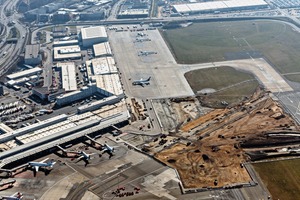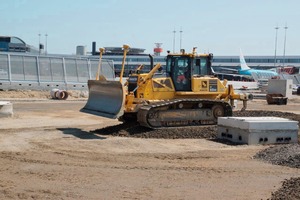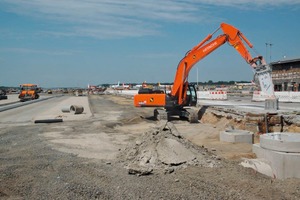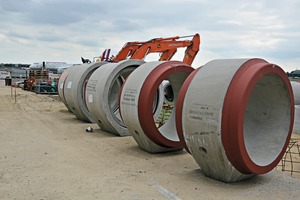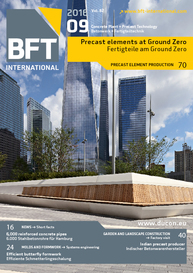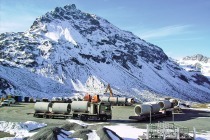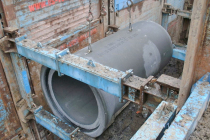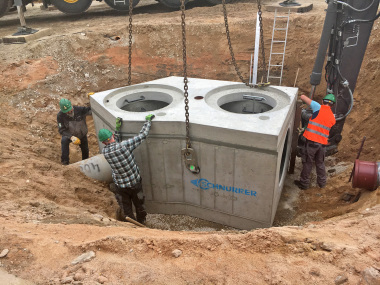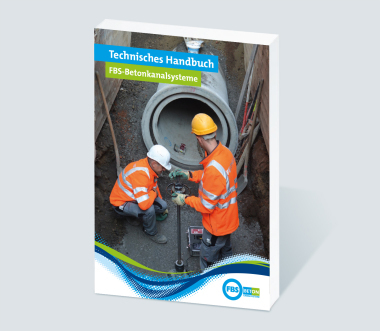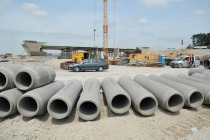6,000 m of reinforced concrete pipes for Hamburg Airport
Hamburg Airport, known in Germany as Flughafen Hamburg and in future called “Helmut Schmidt Airport”, is the fifth largest airport in Germany with approx. 15.6 million passengers in 2015. It is a hub for the airlines Germanwings, Easyjet and Ryanair and, being opened in 1912, it is the oldest airport in the country. The concrete areas on the 570 hectares site situated about 8 km north of the city center have not been repaired for nearly 60 years. For this reason, the airport is planning the complete renewal of the main apron (apron 1) on an area covering 330,000 m² in the period from 2016 to 2020 for an amount of about 120 million euros. The complete renewal of the storm water sewer system is also planned in the course of this project. For several reasons, the planners decided to use a solution of reinforced concrete pipes in compliance with the quality of the German Trade Association for Concrete Pipes and Reinforced Concrete Pipes (FBS – Fachvereinigung Beton- und Stahlbetonrohre).
The construction works on apron 1 have been started in March 2016. Since not only the concrete surfaces of the apron were defective, but also the entire storm water sewer system throughout the area, the awarding authority decided to replace the existing sewer system completely. As part of the basic maintenance, 27 positions are created in the pier area and 15 positions in the two remote islands. The requirements on the drainage as well as the materials to be used were very high. Owing to the partly low cover for the pipes with the resulting impact on the pavement of the airport traffic areas in case of flexible GRP pipes, the awarding authority decided to use reinforced concrete pipes.
Reinforced concrete pipes with customized configuration
“Owing to the high loads which we have to cope with here on the apron, only reinforced concrete pipes are used with a customized configuration,” says Dipl.-Ing. Sascha Bätz, the project manager of Bickhardt Bau AG. “In concrete terms this means doubling the reinforcement in comparison to standard pipes. In addition, we argued in favor of considerably increased wall thicknesses as far as pipes with diameters of 300, 400 and 500 mm are concerned. Instead of the usual 70 mm for pipes of DN 300, theses pipes feature wall thicknesses of 120 mm consistently in order to meet the requirements on the concrete cover.”
Apart from the stability, the resistance of the pipes to aggressive substances also played an important role for the planners. For this reason, the wastewater manual of the airport stipulates, among others, to use a particular concrete and specific sealing. “The pipes were manufactured with a concrete that complies with compressive strength class C60/75,” project manager Bätz states. “Hence, the strength even exceeds the required value of C40/50 according to DIN V 1201. It was also verified that all primary materials are resistant to the alkali-silica reaction. The Ankerplus L integrated seals in NBR quality are used as sealing system.”
High demands on drainage
Only pipes cured in the mold were used in building because this was an additional requirement stipulated in wastewater manual. These pipes feature particularly high dimensional accuracy and provide excellent hydraulic properties due to the smooth surface. The method, moreover, allows the use of pipes with a water penetration depth of only 5 to 10 mm, which is far below the value of 20 mm required by the wastewater manual.
“The quality guidelines, according to which the products were manufactured, are also an important aspect,” Bätz says. “The concrete and reinforced concrete pipes, which were totally supplied by Betonwerk Bieren located in Bad Oeynhausen, were manufactured in accordance with DIN EN 1916 and DIN V 1201 as well as in compliance with the increased requirements of the FBS quality guideline, part 1.” The manufacturer is a member company of FBS and had manufactured the pipes in compliance with the quality guidelines of the German trade association. These guidelines require extensive production control by the factory. This ensures complete quality surveillance from the primary materials to the production through to the finished product. In addition, external control carried out every six months by Güteschutzgemeinschaften (quality control associations), recognized by the building authorities, and testing institutes provide for compliance with the high standards.
Logistic challenge
Logistically, the installation of the overall 6,000 meters of reinforced concrete pipes and more than 80 round manholes also was a real challenge: To ensure rapid delivery sequences, the manufacturer used four molds of DN 800/3000 which are loaded twice. Despite the high security standards at the airport, it was possible to provide the materials needed on site as required thanks to special training of the drivers.
The construction works will be implemented in ten sections at staggered intervals, to keep the impact on air traffic as low as possible. The project is scheduled for completion in 2020. The new life cycle for taxiways and aircraft positions is said to be about 25 years according to the airport operator.

